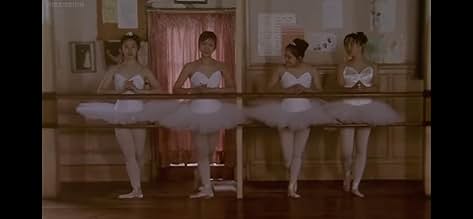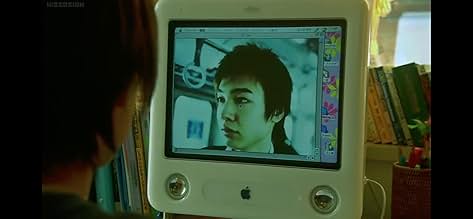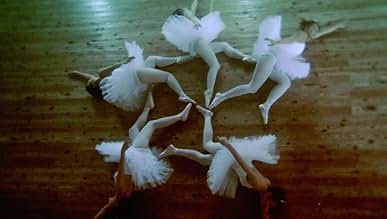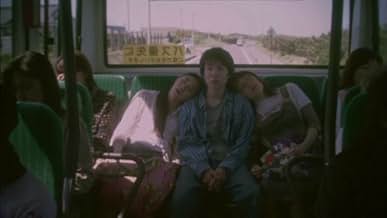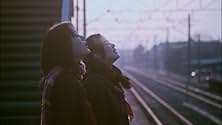IMDb RATING
7.2/10
5.1K
YOUR RATING
When two best friends develop a crush on the same boy, they develop a plan to trick him into dating them.When two best friends develop a crush on the same boy, they develop a plan to trick him into dating them.When two best friends develop a crush on the same boy, they develop a plan to trick him into dating them.
- Awards
- 1 win
- Director
- Writer
- All cast & crew
- Production, box office & more at IMDbPro
Storyline
Did you know
- TriviaAlthough released almost 11 years before The Murder Case of Hana & Alice (2015), this movie actually serves as the sequel.
- Quotes
Setsuko "Alice" Arisugawa: I saw 'Hannibal' on satellite last night.
Hana: So did I.
Setsuko "Alice" Arisugawa: I was scared.
Hana: Isn't he creepy?
Setsuko "Alice" Arisugawa: Yeah. Don't you think real people are scarier... than zombies and ghosts?
- ConnectionsFeatures Horus: Prince of the Sun (1968)
Featured review
Near the end of Mike Leigh's Vera Drake (trivial spoiler about Vera Drake but not about Hana and
), Imelda Staunton's Vera stands accused, caught, guilty. For what seems an eternity of fictional if not real time, before an ever-expanding body of those-who-know, she displays, in her eyes and quivery cheeks and chin, her shame. Shame's a fluid thing, grows, changes as one's conscience, if that's what it is, reaches about for new embarrassment on which to feed, and so is Vera's face in these scenes ever-changing. Time races, falls with a dreadful weight, but at the same instant it stops dead. Such embarrassments eventually slip our minds. Everyday rote erases them. We banish, delete, forget them, as well as we can, but they never exactly end. Each moment itself is something like eternal.
Elsewhere I've remarked the map-ability of Iwai's films: Uchiage hanabi, shita kara Miruka? Yoko kara Miruka? (1993) with both it's title conundrum and the on-the-road debarkation point for the alternate endings; April Story with its out-of-place fly casting; Love Letter in which doppelganger heroines overlap in space but never meet; Picnic whose protagonists walk the top edge of a wall that miraculously traverses their city; Yentown where the map one lives represents one's caste. Lily Chou Chou I haven't found time yet to re-watch and digest, but its characters travel, both locally and afar to that "Disney Jungle Ride" bit, and its concert throng near the end moves in a single direction that killer moves against. Motion needs map-able space. Iwai playing a film "director," in Hideyaki Anno's Ritual, walks/strolls/travels into and through the story and the maybe-mad girl's space. Undo has none of this. You hardly know where one set is in relation to another, as if linear space has collapsed into Moemi's bindings.
In Hana and Alice as in Undo, only the protagonists connect sets: trains, school, parkland, dance floor, etc. If anything in it is map-able, it's the two girls', and deadpan Miyamoto's, faces. Whether she's scheming, at a loss, or caught, Hana's face quivers with unceasing thought, at least as credibly and no less momentously than Vera caught. Like many liars, Hana thinks too much. She hasn't mastered yet the art of not thinking, seems not to realize the ease and simplicity of truth-telling. We see, much more often than hear, what Hana is thinking. Though the film's full of music, Hana's pre-verbal, or anti-verbal, thoughts reach us as if in dead silence, in what sounds like silent-film silence. Iwai's camera and his choice of close-ups of both girls suggest he knows this. I imagine Iwai cast Suzuki as Hana because of this silent ability. She'd displayed it to less merit in Returner. Aoi plays Alice less externally, or at least less facially. (My terminology's confusing. Alice is more of an introvert, perhaps, so uses body language which is external. But her face, early on, reveals less.) Note her mime-like dance in the animal suit: She slowly, magically reenters Hana's and our perception. At first Hana and we, for Hana, don't know whether to be annoyed. Is it one of those annoying stalking mimes? Is it sane?
Besides in faces, map Hana and Alice in Time. Amnesia's about losing Time, time already used, already spent, used up, gone, and so wasted if not remembered. The plot's machinations, Miyamoto's beyond-belief credibility, his in and out, on and off belief in the branchings of Hana's out-of-control lie, bend Time. Hana hands him a past, a chunk of time, then implicates Alice in yet another. Riding Hana's materialized daydream, Miyamoto travels to and fro, back and fore, but not in space. Hana and Alice is Iwai's La jetée.
But guess what! The film is hilarious. I can't think offhand of another film as simultaneously pictorial, euphonious, and simply funny. The humor is anything but situational. It has the warming reality of the everyday, of things and people we all know, because it transpires in the two girls cheeks, brows, and eyes.
There was a temptation to call H & A All About Lily Chou Chou's light antithesis. I don't feel that, choose not to. For touch points, besides La jetée and silent film, look maybe to Shakespeare's comedies, maybe even to his noisome clowns.
Elsewhere I've remarked the map-ability of Iwai's films: Uchiage hanabi, shita kara Miruka? Yoko kara Miruka? (1993) with both it's title conundrum and the on-the-road debarkation point for the alternate endings; April Story with its out-of-place fly casting; Love Letter in which doppelganger heroines overlap in space but never meet; Picnic whose protagonists walk the top edge of a wall that miraculously traverses their city; Yentown where the map one lives represents one's caste. Lily Chou Chou I haven't found time yet to re-watch and digest, but its characters travel, both locally and afar to that "Disney Jungle Ride" bit, and its concert throng near the end moves in a single direction that killer moves against. Motion needs map-able space. Iwai playing a film "director," in Hideyaki Anno's Ritual, walks/strolls/travels into and through the story and the maybe-mad girl's space. Undo has none of this. You hardly know where one set is in relation to another, as if linear space has collapsed into Moemi's bindings.
In Hana and Alice as in Undo, only the protagonists connect sets: trains, school, parkland, dance floor, etc. If anything in it is map-able, it's the two girls', and deadpan Miyamoto's, faces. Whether she's scheming, at a loss, or caught, Hana's face quivers with unceasing thought, at least as credibly and no less momentously than Vera caught. Like many liars, Hana thinks too much. She hasn't mastered yet the art of not thinking, seems not to realize the ease and simplicity of truth-telling. We see, much more often than hear, what Hana is thinking. Though the film's full of music, Hana's pre-verbal, or anti-verbal, thoughts reach us as if in dead silence, in what sounds like silent-film silence. Iwai's camera and his choice of close-ups of both girls suggest he knows this. I imagine Iwai cast Suzuki as Hana because of this silent ability. She'd displayed it to less merit in Returner. Aoi plays Alice less externally, or at least less facially. (My terminology's confusing. Alice is more of an introvert, perhaps, so uses body language which is external. But her face, early on, reveals less.) Note her mime-like dance in the animal suit: She slowly, magically reenters Hana's and our perception. At first Hana and we, for Hana, don't know whether to be annoyed. Is it one of those annoying stalking mimes? Is it sane?
Besides in faces, map Hana and Alice in Time. Amnesia's about losing Time, time already used, already spent, used up, gone, and so wasted if not remembered. The plot's machinations, Miyamoto's beyond-belief credibility, his in and out, on and off belief in the branchings of Hana's out-of-control lie, bend Time. Hana hands him a past, a chunk of time, then implicates Alice in yet another. Riding Hana's materialized daydream, Miyamoto travels to and fro, back and fore, but not in space. Hana and Alice is Iwai's La jetée.
But guess what! The film is hilarious. I can't think offhand of another film as simultaneously pictorial, euphonious, and simply funny. The humor is anything but situational. It has the warming reality of the everyday, of things and people we all know, because it transpires in the two girls cheeks, brows, and eyes.
There was a temptation to call H & A All About Lily Chou Chou's light antithesis. I don't feel that, choose not to. For touch points, besides La jetée and silent film, look maybe to Shakespeare's comedies, maybe even to his noisome clowns.
- frankgaipa
- Feb 14, 2005
- Permalink
- How long is Hana and Alice?Powered by Alexa
Details
Box office
- Gross worldwide
- $654,448
Contribute to this page
Suggest an edit or add missing content


